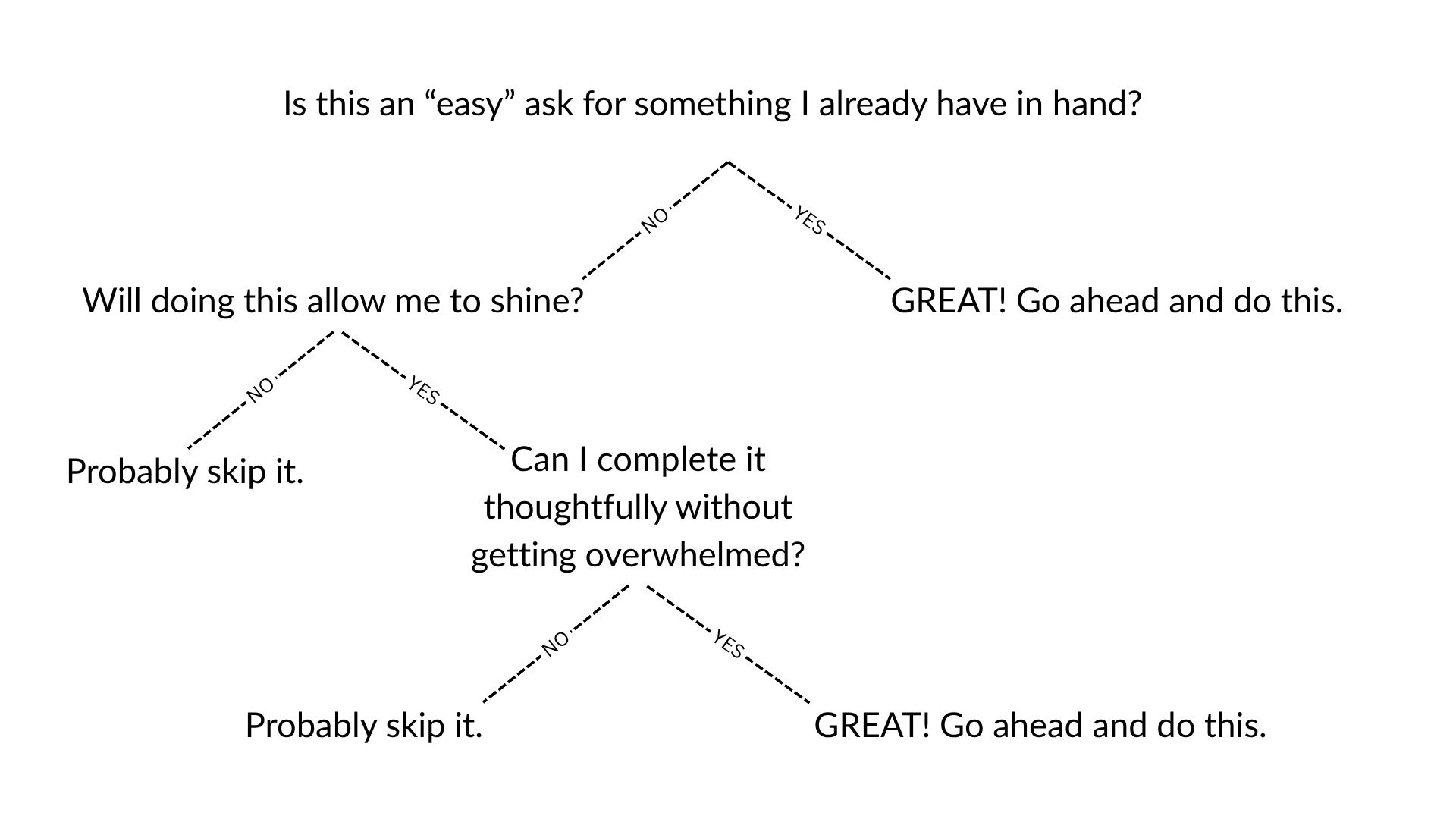On Being Deferred
There is good news and bad news about being deferred by an Early Action/Decision college. The good news is that the door to that school has been left slightly ajar - there is still hope. The bad news is that the hope is tenuous.
Colleges defer, rather than deny, students for many reasons:
- Even if the student did not rise to the top of the early pool, the application may nevertheless be sufficiently appealing for the admission committee to want to reevaluate the student within the bigger Regular Decision (RD) applicant pool. And, if that second review confirms a student's relative strength, it may pull the applicant into the class.
- The admission office may just want to acknowledge a student's hard work and admirable striving - a gentle, if ultimately futile, pat on the head.
- A college may also want to defer students as a hedge against an uncertain yield, since deferred admits yield at a higher rate than RD admits. This too inflates the number of deferred students.
- No school wants to offend alumni families and donors by flatly saying “no” to a less-than-stellar legacy, for example, or deter other strong students from applying by denying a high school's valedictorian early.
What should you do if you’re deferred?
- First, assume the worst. That is, while many deferred students will still be admitted, most will end up being denied in RD. (Colleges are very reluctant, and rightly so, to drag deferred students all the way onto the waitlist at the end of RD.)*
- Knowing this, begin to move on, practically and emotionally, by focusing on your RD schools instead (or potentially identifying a well-chosen ED2 school). Indeed, many students do this so successfully that, in the end, they turn down later admission to their ED or EA school in favor of one that admitted them in RD.
- In the short time you might have before RD deadlines pass, reassess your college list and make sure you have enough great target and likely schools.
- Colleges know that admitting a deferred student in RD is no guarantee that he or she will attend. So let your deferring college know that it remains your top choice, if this is true. (But if you describe a college lukewarmly as "one of your top choices," they are not likely to feel as warmly towards you as you would like, either!) Many colleges, such as Stanford, will give deferred applicants a template - a series of questions or small essays - with which to express their continued interest, but many will not. Send these schools a short email, addressed to either the regional admission officer or to the college's general admission email address. Be careful though – some schools have explicit prohibitions on sending them anything additional (other than updates to testing and/or citizenship status). Be sure to follow the directions that each school outlines in the deferral letter (and see our article on “Letters of Continued Interest” for more information).
- When you send a note to your deferring college, do not irk them with a repeat of your initial application - they read it the first time! Instead, use the occasion to reflect, very succinctly but warmly, on why the school still interests you. Update the reader with any new developments - awards and prizes, extracurricular success, news of a great first semester, or recent scores.
- Note the emphasis on brevity - the more you waffle on at unnecessary length, the less likely you are to keep the weary reader's attention. Also, don't slather on the platitudes and risk sounding fake.
- Some colleges will welcome an additional letter of support from a teacher, coach or alumnus who can speak to your strengths. But don't blitz the college with supplementary letters from people (no matter how famous) who either do not know you well or who have little of relevance to add. These bits will only obscure what the college does want to know about you!
- And don't forget to thank the admission officers for their consideration. They are working long hours with good intentions, so give them their due!
*A note about the difference between deferrals and waitlists:
Many students and families understandably confuse these terms as they seem to confer the same delayed timeline. But the timeline is, in fact, an important distinction. Deferrals are given to students who applied early, were not accepted early, but will be reconsidered in the Regular Decision round of admission. Waitlists are given to students who were not admitted to the initial class, but may or may not be reconsidered later in the enrollment period if the institution needs more students to meet their enrollment and/or financial goals. Many waitlisted students are simply “released” from the waitlist once the institution is satisfied that they have secured their incoming class. Both results are disappointing to students and can drag out the process, but only deferred students are guaranteed reconsideration later in the process.
Waitlist Wisdom
It used to be that at the end of the application season, students got either thick acceptance packets or thin envelopes that dashed their hopes. With most decisions now online, there is less warning of what to expect on notification day. But whether the outcome is a happy or a sad one, it offers clarity. The same is not true, however, when you are waitlisted! For many students, this twilight decision between being accepted and being denied can be the hardest. So, what does it mean?
What is a waitlist?
Waitlists are a way for colleges to hedge their bets against the uncertainty of knowing how many students will accept their offer of admission. Because of such uncertainty about their "yield," colleges create a list of admissible students who can fill the gaps left by those who decline their offers of admission. Your chances of being admitted from the waitlist, therefore, depend on how many accepted students will say yes to that college.
Because yield matters to colleges – too many students and they end up with crowded dorm rooms and laboratories; too few and their budgets suffer – they rely on waitlists. Last year, about 43% of all colleges used one. In addition, colleges can use the waitlist to “correct” for their institutional goals. Do they “need” more male humanities students from the Midwest? Female mathematicians? First-generation or rural students? When admission officers waitlist students, it can also be a way for them to recognize students whom they deeply admired, even if they were not the strongest in the applicant pool.
From the perspective of a waitlisted student, though, the practice looks a bit different. Nationally, colleges admitted about 20% of students who chose to remain on waitlists. But, according to NACAC, the national admission organization, among selective colleges, only 7% of students remaining on a waitlist were ultimately admitted.
Those figures suggest that the waitlist is indeed a long shot, but also that at some schools in some years, there is at least a window of opportunity!
What should you do?
First, carefully review all the colleges and universities that have sent you acceptance offers and re-evaluate. Even if you still have a corner of your heart set on the waitlist school, please give yourself a solid backup plan by accepting the best offer of admission that you have already received. Send in a deposit, with the understanding (and parents’ agreement) that you will forfeit that deposit if (and it is a very “big” if!) your waitlist school accepts you from its Waitlist. Knowing that, no matter what, you have a place to enroll in the fall will greatly reduce your stress!
You may want to get out of the waitlist purgatory altogether and move on with your life by allowing yourself to be excited about a college that values and wants you, and has accepted you! Remember, there is no one institution that is the perfect (and only) “fit” for you; there are many. So, fully invest in another school and move on.
If you do stay on a waitlist, remember you may not hear back from this school about a final decision until well into the summer. Be sure that you understand each college’s unique policies before accepting a waitlist offer. Find out if there would be a change in housing options or in your financial aid package. Also, financial aid may not be available to waitlisted students, as the accepted students will have their needs met first. If you are accepted to a school off the waitlist, you sometimes will have only 24-48 hours to decide whether or not to attend. Therefore, only stay on the waitlist of schools of high interest to you!
Next, let the admission office of your waitlist school know that you will remain on their waitlist and will attend their school if accepted – some colleges ask that you do it online or by returning a signed card. But then follow up with something more personal and passionate – a letter or email that makes your commitment explicit and sets out the reasons why the college remains your top choice and what you have to contribute. Include any updated information (along with documentation) about your strong spring grades, new awards, work experience, or extracurricular activities. A (new) letter of recommendation from a teacher, guidance counselor, or alumnus could be helpful, as could an interview and/or a personal college visit, even if you have already completed those steps. You might even consider saying that you would be willing to enter in January, after the first semester has passed, and either take or not take courses at another college during that term, as they prefer. For many students, this may not be a good option, but some colleges do offer the opportunity.
Above all, continue to keep a positive attitude, study hard, get good grades, and stay involved with all of your extracurricular activities. Enjoy your last days of high school -- soon they will be in the rear view mirror as you race off to your future at a college you will quickly call home!
What does “optional” mean, anyway?
Every fall, I find myself responding to one question more than any other: The college says this is “optional” – how do I know if I’m really supposed to do it?
The world of “optional” in college admissions has expanded far beyond “test optional” – the optional submission of SAT or ACT scores. Working through an average-length college list of 8-12 schools, a student might be confronted by any number of “optional” aspects of the application. Among them:
-
- Optional resume
- Optional supplemental essay(s)
- Optional test scores
- Optional upload of your “unofficial” high school transcript
- Optional Common App essay
- Optional “my space” page to include “anything else that might add to your application”
And even after the student submits the application, they might be confronted by a new list of “optional” credentials in the application portal. Among them:
- Optional completion of a Self-Reported Academic Record (or STARS)
- Optional “getting to know you” video, through Glimpse or another platform
- Additional optional supplemental essays
- Optional alumni interviews
With so much noise and confusion, how should students make rational decisions about what to do? How can they decide what’s worth their time? How can they eliminate what can be avoided? And, how can they make choices that won’t negatively impact their decision?
My advice is simple:
Complete the optional items that genuinely help you tell your story, and skip the ones that create more stress than benefit.
To break it down even further, try a “decision tree” with these three questions:
Is this an "easy" ask for something I already have in hand?
Will doing this allow me to shine?
Can I complete it thoughtfully without getting overwhelmed?

Let’s take the optional resume as an example…:
Some students have a resume that is easily accessible and on hand. These students should go ahead and upload their most recent resume document. Other students might not. For these students, will the resume they write simply repeat the required Activities List? If so, then it doesn’t provide any additional context to allow the student to shine, and therefore they should skip it. However, should a student have additional context to provide that the Activities List did not provide the space to cover, then the resume should be made and uploaded.
What about the optional alumni interview…:
Students definitely don't have an interview “on hand” for an easy upload. However, for almost all students, an opportunity to have a conversation (in person or on zoom) with an alumni of the college would be a wonderful opportunity to shine and show their personality. Students can next ask, “Would this 30-45 minute conversation cause me great stress and anxiety?” and if the answer to that is “no” or “only a little bit,” then they should go ahead and sign up for that interview.
In conclusion:
No doubt about it, “optional” options add to the stress, chaos, and confusion already woven into the college application process. When you are confronting whether or not to submit an optional item, think carefully about the value-add and the “cost” of your time. Check in with your counselor or other trusted adults to see what they think. Keep in mind that in this, as with most things, there is no single “correct” answer that applies equally to all students. Just do your best and trust yourself!
Seven Steps to Secondary School Interview Success
There is so much about applying to boarding schools that can feel overwhelming. Grades, essays, and recommendations are all important pieces of the puzzle. But one portion of the process is much simpler, and within your easy control. The interview is your chance to present yourself in an authentic and constructive way, and a chance to make your candidacy appealing to the admissions team.
After more than three decades working in school admissions, here are my seven key tips to acing your admissions interview (3 before, 3 during, 1 after):
Before the Visit:
- Reach out to the admission office to arrange a campus visit and schedule the interview. Let them know if you’d like to meet with a head coach or program director. If possible, learn which admission counselor you will be meeting.
- Review the school’s website. Get familiar with some of the unique attributes or programs at the school, such as a strong science program or unique travel opportunity.
- Prepare at least two questions to ask the interviewer that relate to the school’s unique attributes. Beyond gaining insights, these questions signal to the interviewer that you’ve done your homework. You will typically have a chance towards the end of the interview to ask questions, in the event it doesn’t come up organically in conversation.
During the Visit/Interview
- Be ready to ask one or more of your prepared questions of your tour guide and/or your interviewer. For example, “I understand that the school has a strong music program. I am a violinist and would like to know more about your practice rooms. May we see them?”
- School staff will be observing how you interact with students and adults. Be polite to everyone, including your parents! Smile and/or say hello to people you pass in the hallways, on sidewalks, etc.
- During the interview, relax. You are being asked to speak about a subject that you know better than anyone on Earth – yourself. If you get a question that puts you off balance, don’t worry. It’s ok to stop and reflect before answering the interviewer’s questions.
After the Interview
- Send a thank you email or handwritten note, thanking the interviewer and mentioning one element of the visit that you especially liked.
Remember, the school visit is your best opportunity to determine if the school is the right fit for you. By following these tips, you can make the most of your visit and gather the information you need to make an informed decision.
The admission process isn't overly complicated, but being well-prepared will ensure you and your parents gain a comprehensive understanding of the school communities.
The why, what, and when of the PSAT
What is the PSAT/NMSQT?
The Preliminary SAT/National Merit Scholarship Qualifying Test (PSAT/NMSQT) is a digital exam that mirrors the SAT in terms of content, structure, and scoring. For 11th graders, the PSAT also determines eligibility for the National Merit Scholarship Program. Students who score among the very top test-takers in their state (about the top 1%) become National Merit Semifinalists, and about 7,500 of these students nationwide are ultimately named National Merit Scholars after an application process.
Why are there different versions of the PSAT?
- PSAT 8/9 – designed for 8th and 9th grade students. The questions are more accessible, reflecting what students at this grade level are learning.
- PSAT 10 – if offered, this one is given in the spring of 10th grade. It is identical in format and difficulty to the PSAT/NMSQT but does not qualify students for the National Merit program.
- PSAT/NMSQT – taken by 10th and 11th graders in the fall (October). Only 11th grade scores count toward National Merit recognition.
Are the PSAT and SAT the same test?
Not exactly, though they are very similar:
- Both are digital tests delivered through the College Board’s Bluebook app.
- The PSAT is shorter (about 2 hours) than the SAT (about 2 hours, 14 minutes).
- The PSAT is scored out of 1520; the SAT is scored out of 1600.
- The PSAT is slightly easier, especially in math.
Where and when will I take the PSAT?
The PSAT/NMSQT is administered through high schools each October. Schools can choose from several weekday or Saturday test dates. Most students do not need to register individually — your high school usually handles registration.
Instead of a paper prep booklet, you’ll prepare and test in the Bluebook app, which runs on school-managed laptops or tablets (most often Chromebooks). Practice materials are available in the app and through Khan Academy.
How much does the PSAT cost?
The PSAT costs $18, but whether you pay depends on your school. Some schools cover the cost, while others may bill students directly. Fee waivers are available for eligible students.
How should I prepare for the PSAT?
- First, don't worry too much about this test! The scores are only for you and your school counseling office. Use the PSAT to help you to understand how much test prep you might want to do in order to prepare for the SAT. You can also:
- Practice in Bluebook. Download the app and try the built-in practice tests so you know exactly how the real test will look.
- Use Khan Academy. The College Board partners with Khan Academy for free practice tailored to your strengths and weaknesses.
Who sees my PSAT scores?
- If you are an 11th grader and score highly enough, your results are sent to the National Merit Scholarship Corporation.
- Otherwise, your scores are shared only with you, your family, and your school.
- Colleges do not receive your PSAT scores.
What kinds of questions are on the PSAT?
The PSAT has two main sections:
- Reading and Writing – 64 minutes, about 54 questions
- Math – 70 minutes, about 44 questions
Each section is broken into two adaptive modules. The first module contains a mix of easy, medium, and hard questions. Your performance determines the difficulty level of the second module.
Questions are mostly multiple choice, with a few math “grid-in” items requiring you to type a numerical answer.
Should 9th and 10th graders take the PSAT in October?
It depends. The PSAT includes math concepts through Algebra 2. Students who have already studied or are currently studying Algebra 2 may benefit from the practice. For others, the test might feel unnecessarily difficult.
Can I get extended time on the PSAT?
Yes. If you qualify for testing accommodations through College Board’s Services for Students with Disabilities (SSD), those apply to the digital PSAT as well.
So really, why take the PSAT?
- Some schools require 11th graders to take it.
- It’s great practice for the digital SAT.
- It can help you decide whether the SAT or ACT feels like a better fit for your testing style.
Must I? The concept of the PSAT causes me great stress.
In short, you don’t need to. The PSAT, however, is a truly low-stakes way to practice a timed standardized test in a way that might be very helpful for your eventual college process.
Notes from our Founder (summer 2025)
As the "Director Emerita" of College Goals, I want to share a few thoughts with the parents of our current and future students . . . and with the young people themselves. The students who just graduated from high school this past spring, or are planning to graduate from high school next spring, were the 12-13-year-old middle-schoolers we snatched out of 6th or 7th grade in March 2020 – during those "formative" (greatly challenging, especially socially!) years. They were completely unable to explore the opportunities (and, yes, the horrors) of middle-school decisions, mistakes, and relationships . . . nothing was "safe," except on a screen. Inevitably, they developed and, in some cases still sustain, a level of fear.
What should they do now?
Many realize the college path no longer necessarily leads to whatever has been viewed as "success." Furthermore, many kids are understandably both eager and afraid of "leaving home" or going too far away. Meanwhile, parents are questioning the enormous cost of a 4-year undergraduate degree that may not provide that guarantee of future "success."
What other learning/growing/maturing experiences are available for these young people? What/whom do they respect? How can they possibly prepare themselves to become "adults" amongst the distrust roiling our nation and the world?
I'm really writing to you parents who are dealing with the aftermath of these crises and their impacts on your family's decisions ahead. I hear some parents suggesting their kids take some time off from school, get a job, and see how college admission changes in the next year or two. Students, teachers, parents and yes, college admission officers, are all talking about the influence and effect of AI on students' learning, and on how students demonstrate their learning and present themselves to institutions. What’s the truth, about anything? What’s"real "?
If there was ever a time you needed and could benefit from some concerned, caring, experienced counseling, this is it. Now. Not that even the best of counselors (yes, that’s what College Goals counselors are!) can answer these questions. But they’ve invested their life’s work into listening to all the "players" (students/parents/teachers/admission officers) and working to help families find colleges and other learning options that "fit" their child’s goals, abilities, interests, and developmental needs. They help young people understand and accept who they are and what it is they need, and what can help them thrive and grow into comfortable and responsible "adulting."
The College Goals team thinks, all the time, about the changes in college admission, but also about education abroad, about apprenticeships and trades, about gap years and meaningful work. If you could use a conversation, a listener, a guidepost to what to read/watch/listen to/consider about your teenager, now is the time to talk with someone on our team. We listen deeply. We learn constantly. We care.
AI and Your College Process
Can you just “ChatGPT it”?
There is a lot of misinformation out there about correct and ethical usage of generative AI to support the college process. It is worth considering the ways that you could potentially use generative AI for good – and also to note the ways that it might be easy to abuse the principle and start to cross solid ethical boundaries with your AI use. It is important to say right at the outset that all work you submit to a college must be your own – and for great reasons! They are admitting YOU to be a student on their campus and in their classrooms. The work you submit in your application is how they can best evaluate your fit for their program and the value that you’ll add to their community.
That said, there are a lot of really positive ways that ethical use of generative AI can support your college process, both in the discovery and research phases as well as in the application stages.
Discovery and Research:
ChatGPT is a wonderful thought partner to help you brainstorm colleges to fit your criteria!
If your high school uses Naviance, Scoir, or Maia Learning, you can use one of those programs to run an “Advanced College Search” that asks you to put in your “limiting criteria” (student population, geography, majors, admit rates, etc…) and will generate a list of schools to fit this criteria.
ChatGPT will do the same – and more!
Enter a prompt like this one (but use your own criteria):
“You are my college counselor. I am looking for a list of 15 colleges that meet the following specifications: fewer than 8,000 undergraduate students; a pretty campus; a location near a city; a state on either the east or west coast of the US; a strong economics department; great placement opportunities for student internships; some fun campus traditions that bring the community together; and, a basketball team that people like to support”
In response, ChatGPT reminded me about some schools like Davidson College and Santa Clara University, which both fit these specific criteria well, but it also added schools like Gonzaga University and the College of William and Mary, which both also fit this criteria but would not have been right at the front of my mind!
Once you find a college you like, ChatGPT can also help you to identify other schools that are similar to that school but might have different admissibilities – therefore be more of a target or a likely on your balanced list.
Enter a prompt like this one (but use your own criteria):
“You are my college counselor. I really loved my recent visit to Georgetown University, but I’m worried because it’s really selective. Can you tell me about 10 schools that have the same vibe and academic focus as Georgetown but that admit more than 20% of the students who apply?”
In response, ChatGPT reminded me about Seattle University, American University, and Villanova University (among others), focusing on the strong spirit and traditions along with parallel academic disciplines.
ChatGPT is a wonderful travel agent and can help you to plan your college tours! It can help you think about how long you might want to spend on each campus, how long the travel would be between schools (or from college campus to airport), and also provide you with some other ideas for activities and attractions to explore while you are in town!
Enter a prompt like this one (but use your own plans):
“I am planning a trip to Chicago to visit colleges (Northwestern, University of Chicago, and Loyola University Chicago). Help me to plan a 4 day trip – I will be flying in on the first morning and leaving on the 4th evening – to see these schools and also gives me a chance to explore the area.”
Not only will ChatGPT help you think about what to do when, it will also give you fun restaurant recommendations and other area attractions to explore!
Application Process
As students look at the volume of supplemental essays required by some colleges, it is tempting to consider just outsourcing the writing process to their favorite generative AI “friend” and breezing through the work. However, the essays that ChatGPT creates, while technically executed and on point, lack soul, spirit, originality, and humanity. When you read a lot of college essays every day, it is easy to tell which college essays have been written by generative AI. Students might not craft sentences with the same degree of grammatical correctness, but student writing always feels like it was written by a person.
That said, there are still a number of ways you can utilize the tools of ChatGPT to support your application process. Here are two!
- Getting your activities list down into the 150 character “Description” box on the Common App: You can ask ChatGPT to help you pare down your activities to fit into the description box on Common App by giving it a prompt like this:
“I need your help writing about my activities. I’d like to have them described in a format that uses only phrases, each starting with a unique verb. The phrases should be separated by a ; punctuation mark. The whole description can be no longer than 150 characters. Now use these rules to describe my work on [insert activity here]”
- Learning about campus specifics to support your “Why do you want to attend [College Name]?” essays: You can ask ChatGPT to help you with some details that will enhance your writing on your “Why X College?” essays. Say your weekend job at home is in a specialty grocery store. Ask ChatGPT to tell you about the best specialty grocery stores near the college campus. What if you participate in a mentoring program for young musicians in your hometown. Ask ChatGPT to tell you about some of the music-related community service work that students do on that campus. Additionally, have ChatGPT tell you about favorite campus athletic traditions; cozy campus locations to read a good book; the best coffee shop within walking distance of campus; or, remind you of the name of the student internship placement program. A good “Why X College?” essay will include some great proper nouns associated with the school, and ChatGPT is an excellent thought partner to find yours!
Again, it is unethical and wrong to have ChatGPT do more for your process than to participate in some of these exercises. It cannot write your essays, or edit them for you! That said, leveraging the power of generative AI can be supportive of both your list building and writing efforts!
Don’t just take our word for it! Want to learn more? Read these two excellent blog posts from the Georgia Tech Admissions Office:
"Do you have any questions for me?"
A guide to one aspect of your college interview:
Often, at the end of a college admissions interview, the alumni (or student) interviewer will turn to the candidate and say: “Do you have any questions for me?” This is a wonderful moment for you to seize an opportunity, so do not let it pass you by!
First, what NOT to do:
- Say “no, I don’t have any questions” about this college
- Ask a “yes or no” question whose answer could be easily Googled (“Does College X have a French major?”)
- Ask any question whose answer could be learned from your explorations of the college’s website (“Where do you have study abroad programs?”)
- Ask a question whose answer is generally mundane (“How good is the math department?”)
- Ask a “stock” questions that sound like ChatGPT wrote it for you (“What do you think makes College X unique compared to other schools, especially in terms of its student culture or academic opportunities?”) *ChatGPT did write this one!
What SHOULD you do:
- Ask a question that makes a clear connection to YOU
- Invite your interviewer to tell you a story from their experiences as a student
How do you do this?
Prepare in advance!
Think of a few things that are central to your interests, your character, and your application and craft thoughtful questions connected to these interests BEFORE you go into your interview. Be sure to keep the question short, but also make sure it includes enough depth and detail to highlight your interest in the area at hand.
Here are a few examples:
- Sustainability is really important to me and my work with our school’s Green Team has been among my favorite extracurricular activities. I was really proud of our recent “Weigh the Waste” contests to reduce dining hall waste at lunches. I’m curious if you can tell me more about how students at College X are involved in environmental sustainability initiatives? What types of projects have students spearheaded at College X to make the campus greener and improve the school’s environmental footprint?
- My high school’s small size has been really important to my growth as a student. I love building relationships with my teachers both in and out of the classroom. College X is a lot bigger than my high school, and I want to make sure that I can still get to know my teachers. Can you tell me about some of your favorite professors at College X? How did you get to know them outside of lectures?
- The best projects I have done in my classes have been collaborative ones, where each member of our team contributes their own expertise to our success on the project (and maybe give a little example). Given how selective College X is, I’m worried that the school might foster a more competitive than collaborative environment. Can you tell me about how you found the school to be on the spectrum from competitive to collaborative? Was the same also true for your friends?
You can write your questions down on a notecard and bring it with you to your interview! When the interviewer asks if you have any questions, it is ok to pull out your card and read one! Having your questions in advance shows that you are thoughtful and prepared.
Want to know more about college interviews from the “inside”?
Check out this great episode of the Inside The Yale Admissions Office podcast (“Interviews” – 28 minutes)
Letters of Continued Interest: Myths and Reality
Google “I just got deferred from my Early Decision school! What can I do now?” and you’ll be directed toward any number of threads and conversations filled with myths and partial truths about the purpose, structure, and value of the “Letter of Continued Interest” (LOCI) to be sent to support a student’s chances in the Regular Decision round.
MYTH: The letter needs to be submitted immediately following the defer decision to assure that the school knows the student isn’t too disappointed about being deferred and/or is still very interested in attending.
MYTH: There is a perfect LOCI that the student could craft that would all but guarantee admission in the regular round.
MYTH: Students who have been deferred ED have a better (or worse, depending on what you read) chance of being admitted in the regular decision round than students who simply applied RD.
MYTH: Students should do more than just write a letter, they should call and/or visit the college, send additional letters of recommendation, request a meeting with an admissions officer to explain their interest, send cookies/flowers/cardboard cutouts of their face, in order to ensure that the school knows how very interested they are.
In truth, each of these is just that – a myth about admission.
Truth: LOCIs should be sent in mid-January, not only after a student has taken the time to craft great supplemental essays for the other schools on their list, but after they have an update to share with the school (which is likely after first semester grades have been reported).
Truth: All LOCIs are different and should be unique and individual to the student, and their interests and aspirations. There are no guarantees in the world of admissions, and LOCIs are a part of that reality.
Truth: Each student in the RD round has the same “chance” of being admitted as each other student in the round. There are no special points (or demerits) for the ED deferred applicant. About the same percentage of applicants are admitted after a deferral as are admitted from the entire pool. (ie: If the school has an RD admit rate of 5%, about 5% of the deferred ED applicants are admitted as are about 5% of the RD applicants)
Truth: Students should simply write one letter (one LOCI). They should absolutely not visit, call, interrupt, send anything else, or otherwise inundate the admissions office. Students (and parents) need to simply trust that the process does work out and that one LOCI is sufficient.
So what is the formula for a great LOCI? It is simple. One letter, 4 parts, 250 words or about ½ a page:
- Gratitude: For the time during busy RD season; for the defer in a competitive pool, etc
- Updates: Here are some things that have happened to/for/because-of me since I sent you my application in mid-October that I haven't shared yet that I think you'd like to know about in my application
- Connections: Here are some great things that I am/continue to be excited about at your school which makes it such a great fit for ME and are all the things I love about it/your school/my future there (even better if they might connect to your updates!)
- Gratitude Redux: For the “continued consideration” -- and (if applicable) an assurance to yield if admitted (can't do this unless it is true… consider your options!)
Do you want to read more about deferral and steps you can take? Try this excellent blog post from the Georgia Tech Admissions Blog.








